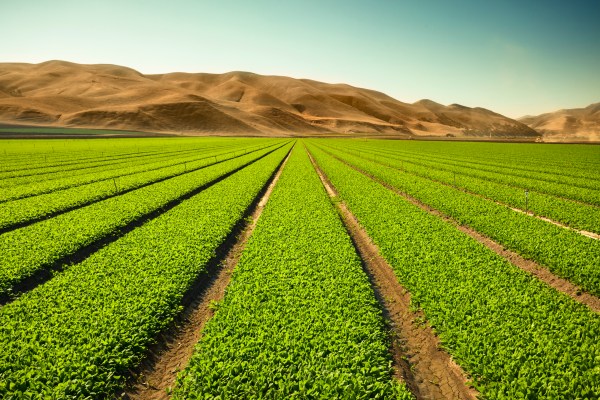Jim Jackson developed timber and farmland in Eastern Washington, protected from coastal rains by the peaks of the Cascade mountains, building out a clutch of apple farms and other properties on the state’s sunny side for 40 years.
Traditionally, he raised money to expand operations for his farms through his existing network, which meant asking previous investors to pool together and come up with the cash.
But more recently, Jackson turned to a fundraising platform that operates entirely online. Like hundreds of other farmers, he’s using a service called AcreTrader to raise money for agricultural development projects. AcreTrader is one of a growing number of companies revolutionizing the way farm and forestland are acquired, developed and commercialized across the United States.
There’s lots of farmland in the U.S. Bill Gates, Microsoft founder and the world’s third-richest man, is the nation’s largest owner of farmland, holding roughly 242,000 acres. That number seems high until you compare it with the 897.4 million acres of land that are currently arable and used for farming in the U.S.
Another 823 million acres of forests dot the United States, the majority of which are privately owned.
Taken together, that’s a massive amount of real estate with economic potential that’s traditionally been accessible only to the ultrawealthy to acquire and finance for development. Now, startups like AcreTrader and others including Tillable, ($8.3 million) FarmTogether ($3.7 million), and Harvest Returns are bringing marketplace models to the farming world — potentially bringing hundreds of thousands of investable acres to financiers looking to diversify.
These marketplaces may also facilitate more than just harvesting crops or timber; companies like SilviaTerra are trying to give landowners extra income by providing onramps to carbon offset markets. Seeing the potential for returns, Tillable teamed up with The Nature Conservancy last year to promote sustainable agriculture and provide ways to monitor and manage carbon sequestration from sustainable farming practices.
These new approaches to financing and developing agricultural land haven’t always been embraced by the farmers they’re purporting to help.
Roughly 80% of farms are actually run by renters who work with landowners to manage their properties and grow crops. These renters have said that companies like Tillable are actually disrupting relationships with landowners that go back decades.
When some farmers heard that the company had sent out letters to landowners suggesting that they rent the fields those farmers had worked on for years, the farm managers were rightfully upset.
At least that was the case for Parker Smith, who runs Smith Farms with his father and an uncle, growing corn and soybeans on land near Champaign, Illinois.
“They’re reaching out to our landlords, that we have relationships with, to sort of go behind the farmer’s back,” Smith told NPR in an interview last year.
AcreTrader focuses on providing a marketplace to renters looking to raise money for projects. Jackson used AcreTrader to raise $2.8 million for a $7 million development project that’s intended to turn one of the farm units Jackson had acquired into a producing orchard.
There’s an LLC that owns the orchard, the land, the equipment and the buildings. By buying a share in the LLC, it’s like investing in a startup on AngelList.
That similarity has led venture capital firms, including Jump Capital, Narya Capital, Revolution’s Rise of the Rest Seed Fund, RZC Investments and Revel Partners to invest $12 million into the Fayetteville, Arkansas-based company.
“Farmland investing is becoming increasingly sought after in the current macroeconomic environment,” Peter Johnson, partner at Jump Capital, said in a statement.
While that may be true, that appetite at the macro level hasn’t translated into investments in the current crop of startups yet. Taken together, the five businesses (including SilviaTerra’s marketplace for carbon credits) have raised roughly $35 million, according to data from Crunchbase. That includes Tillable’s $8.3 million in financing from investors including First Round Capital and Serra Ventures; FarmTogether’s $3.7 million from SeedInvest and angel investors; and Harvest Returns’ few hundred thousand in capital raised for discrete investment vehicles.
“Over the last few months, we’ve consistently seen our offering sizes grow while our funding windows shrink, showcasing the fast-growing desire surrounding this resilient asset class,” said Carter Malloy, founder and CEO of AcreTrader. “As a company that seeks to support and connect farmers and investors in a way that no one else is, we’re humbled by this monumental growth, and look forward to leveraging these new funds to continue on that trajectory.”
AcreTrader’s average financing for farms is between $1 million and $2 million and average commitments from investors tend to be between $20,000 and $30,000 according to Malloy.
And there are still plenty of opportunities for investors to come in and provide additional capital. While private equity has gotten a lot of press for expanding the size of their farmland investments, those investments are still dwarfed by the size of the potential farm industry in the U.S., Malloy said.
“Private equity assets today are $30 billion and it’s about $3 trillion of an asset size,” he said. “There are families that own significant portions of farmland. The extreme majority of farmland is through smaller ownership through families.”
